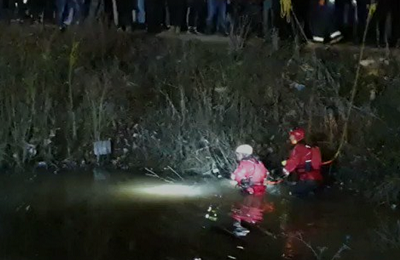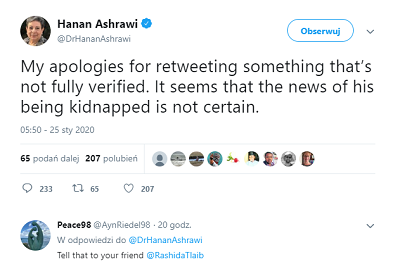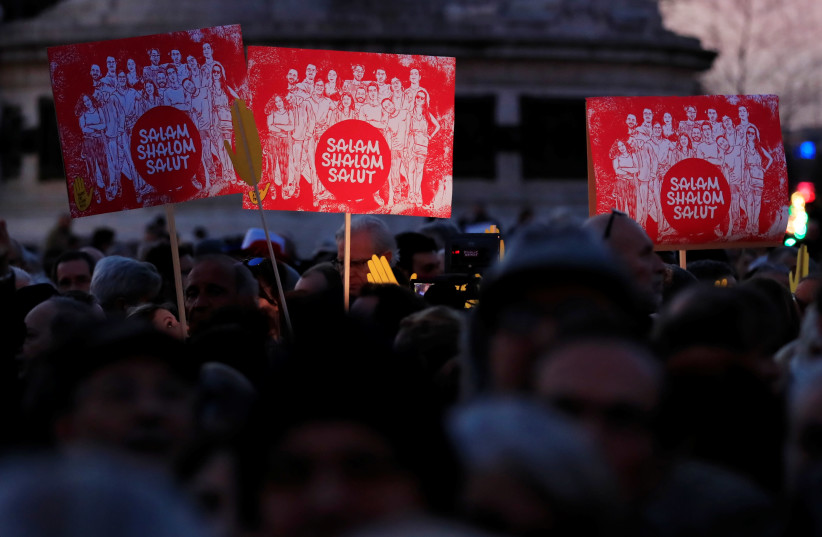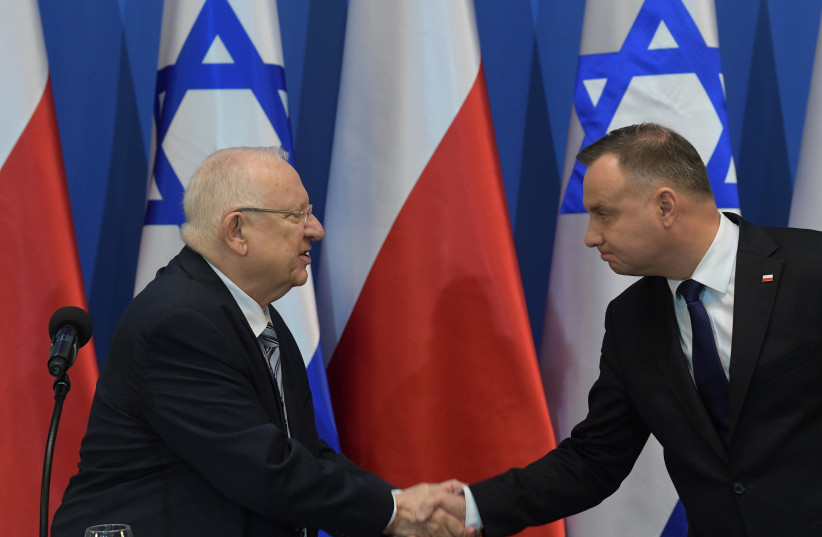 Historia stara jak świat
Historia stara jak świat
Seth J. Frantzman

Wstęp od redakcji “Listów”:
Najpierw był krótki komunikat: policja poszukuje ośmioletniego chłopca, który zaginął w piątek (24 stycznia) wieczorem, we wschodniej Jerozolimie. Qais Abu Ramila widziany był po raz ostatni o godzinie czwartej po południu.
Rodzina najpierw powiedziała, że chłopiec został porwany, potem zmieniła swoje zeznania. Natychmiast wybuchły zamieszki utrudniające poszukiwania dziecka. Policję obrzucano kamieniami. Trzy osoby zostały aresztowane. Psy prowadziły do zbiornika z wodą, w sobotę nad ranem znaleziono zwłoki dziecka. Chłopiec prawdopodobnie pośliznął się na mokrym brzegu, wpadł do wody i utonął.
Tymczasem kłamstwo obiegło świat zanim prawda zdążyła związać sznurówki. (W naszych czasach słynna metafora Marka Twaina utraciła znamiona metafory.)
Palestyńska polityk, Hanan Ashrawi powieliła „wiadomość”, z konta na Twitterze podpisanego “Real Seif Bitar”, że „izraelscy osadnicy porwali, zamordowali i wrzucili do wody palestyńskiego chłopca”, dodając komentarz: „serce się kroi, ból jest nieznośny, nie mam słów”.
Członkini amerykańskiego Kongresu Rashida Tliab natychmiast puściła jej tweet dalej w świat. Po kilku godzinach Hanan Asshrawi pisała: „Przepraszam za przekazanie czegoś, co nie było w pełni zweryfikowane. Jak się wydaje wiadomość o jego porwaniu nie była pewna”. A potem, jak się wydaje skasowała wcześniejsze tweety.

A kim jest człowiek, który wstrząsnął sumieniami antysemitów całego świata? Seif Bitar nie jest dziennikarzem, który był na miejscu, nie jest przypadkowym świadkiem, nie jest przedstawicielem żadnej instytucji. Jest zwykłym internetowym trollem wymyślającym od lat kłamstwa o Żydach. Dlaczego dali mu wiarę politycy i dziennikarze z wielu krajów? Odpowiedź jest tylko jedna – wydawało im się, że to musi być prawda.

Historii opowiadających o porwaniu i zabiciu dziecka przez Żydów były setki, prowadziły nieodmiennie do zamieszek i pogromów. Ochota dawania wiary w takie pogłoski jest jak widać niezmienna. Izraelski publicysta „Jerusalem Post”, Seth J. Frantzman na swojej stronie Facebooka (26 stycznia) pisze:
Seth J. Frantzman:
Jest tylko jeden kraj na świecie, w którym, kiedy gubi się dziecko, a potem znajdują je martwe w wodzie, zachodni politycy (Rashida Tlaib, komentatorzy w Wielkiej Brytanii) i inni zachodni komentatorzy powielają historie o „porwaniu” i „morderstwie” bez cienia dowodów, bez tego, by byli w kraju, w którym to się stało, bez czytania żadnych raportów… tylko dlatego, że… są antysemitami.
Tym krajem jest Izrael.
Jeśli chcesz wierzyć, że antyizraelskie poglądy nie są antysemickie, to zrób prosty test. Jak to jest, że nie ma ŻADNEGO innego kraju na świecie, wobec którego zachodni politycy i wykształcone elity przyjęły postawę „anty”. Jest tylko jeden kraj, wobec którego ludzie są dumnie „anty”. I nie jest tylko przypadkiem, że tym krajem jest Izrael – jest tak z powodu zachodniej obsesji, która istnieje od wielu pokoleń, a jest nią nienawiść do Żydów.
Nie ma żadnych dowodów, że ”antyizraelskie” poglądy są tylko spowodowane krytyką „polityki Izraela”. Dlaczego ludzie w bardzo odległych miejscach nagle mieliby być obsesyjnie krytyczni wobec „polityki Izraela”? Polityka Izraela nie jest szczególnie gorsza niż polityka wielu innych krajów, jak na przykład Turcji. Nie zawsze gorsza niż polityka Chin lub Indii, lub innych miejsc.
Gdyby więc była to tylko krytyka, to logicznie ludzie powinni mieć tę samą obsesję na punkcie wszelkiej złej polityki Chin, Iranu, Turcji, Maroka, Indii, Malezji i Australii. Ale nie mają. Nie ma tysięcy ludzi, którzy obsesyjnie analizują, omawiają i krytykują brutalne traktowanie uchodźców na wyspie przez Australię… lub rasistowskie prawa Malezji.
Tylko w sprawie Izraela. To jest jedyny kraj na świecie, wobec którego ludzie w Szwecji, Wielkiej Brytanii, USA i innych krajach są obsesyjnie „anty” i są gotowi wierzyć w każde nienawistne kłamstwo, jedyny kraj, wobec którego mają taką obsesję, że oskarżają „partię Likud” o wpływanie na wybory w Wielkiej Brytanii i USA. Nie winią żadnych innych zagranicznych partii, których nazw nawet nie znają.
Kiedy więc dziecko zgubiło się w weekend w Jerozolimie… byli gotowi dzielić się podżeganiem, twierdzić bez cienia dowodu, że zostało „zamordowane” przez „osadników” – to jest czyste podżeganie. Nie wzięli tego z arabskich mediów, stworzyli własne narracje, nawet ubarwili relacje i twierdzili, że „izraelskie siły zaatakowały personel medyczny”… kiedy to Izraelczycy szukali tego chłopca.
Bowiem antyizraelskie poglądy są antysemickie. Nie tylko niektóre z nich – wszystkie. Nie ma niczego takiego jak bycie „krytycznym wobec polityki Izraela”, siedząc wygodnie o tysiące kilometrów od tego kraju. Naprawdę? Dlaczego podrywasz się nagle i decydujesz na obsesję na temat Izraela? Dlaczego ludzie, których znałem na amerykańskim uniwersytecie, obsesyjnie czytają o najdrobniejszych szczegółach „izraelsko-palestyńskiego konfliktu”… hmm, czytałeś dzisiaj o Kaszmirze? O… niezbyt dużo.
Nie ma wymówki dla tej ”antyizraelskości”. Jest to tylko przykrywka dla nienawiści. A ta nienawiść atakuje jedną, maleńką grupę na świecie. I dlatego ”antyizraelizm” zawsze prowadzi do obsesyjnych teorii spiskowych i tendencji do tego, że ludzi, którzy są całkowicie logiczni, kiedy chodzi o inne sprawy, wierzą w totalne nonsensy i retweetują totalne nonsensy. I dlatego jest tak mały krok od ich rzekomo „antyizraelskiej” krucjaty do bełkotu o „rotszyldach” i nagłego pragnienia mówienia o Holocauście. Bo nie chodzi tu o Izrael.
Gdyby chodziło o Izrael, to dlaczego jest to o Holocauście? Gdzie są grupy „antyruandyńskich” aktywistów, pouczających nas, że „ofiary ludobójstwa Hutu nie powinny uciskać innych”? Och, nie ma ludzi dających nam takie nauczki. Tylko jeśli chodzi o Izrael, słyszymy także o Szoah. Nikt nie mówi: “jak mogą kambodżańskie ofiary ludobójstwa uciskać lud Cham”. Tak więc tylko wobec Izraela istnieje dziwaczny komentarz: „jak mogą ofiary stać się ciemiężcami w Gazie”. Nie wiem, a jak mogą ofiary kolonializmu w Kongo stać się ciemiężcami? Jak mogą ofiary islamofobii stać się ciemiężcami w Afrin? O czym ty mówisz? Jak mogą bośniackie ofiary lub ofiary z Kosowa stać się ciemiężcami?
Prawdziwym pytaniem, jakie należy zadać, jest to, dlaczego ciemiężcy są ciemiężcami, nie zaś jakieś wyświechtane banały o Izraelu. I dlatego antyizraelskie poglądy zawsze są antysemickie, bo są zawsze obsesyjnie unikatowe. Po prostu nie ma innego przykładu, gdzie kraj jest poddany tak absurdalnej nienawiści, podżeganiu, spiskom i wyjaśnieniom.
* Jedno zastrzeżenie…Izraelczycy i Palestyńczycy mają prawo do obsesji na punkcie Izraela.
P.S. Pod wpisem Setha Fratzmana jest ogromna dyskusja, z mnóstwem przykładów nienawistnych tweetów i komentarzy z całego świata.
P.S. 2. Rashida Tlaib wycofała swój tweet nie trudząc się żadnymi wyjaśnieniami, ani przepraszaniem.




